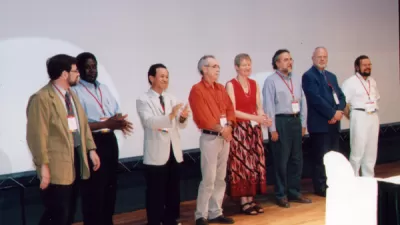More than anything, I remember laughing at them. While I, as a bright-eyed undergrad, woke up at 11 to enjoy my very liberal arts classes in everything from gerontology to the physics of music, the business students would trudge out the door in suits and ties. For class. In late-summer Philly humidity. Eighteen years old and already soulless pre-professional slaves. Poor bastards, I thought. Now that I’m in graduate school, two things keep the schadenfreude at bay as Wall Street drowns in its own excesses. One, karma’s a bitch. And two, as a soon-to-be planner, I’m quickly realizing I’ve become one of them.
More than anything, I remember laughing at them. While I, as a bright-eyed undergrad, woke up at 11 to enjoy my very liberal arts classes in everything from gerontology to the physics of music, the business students would trudge out the door in suits and ties. For class. In late-summer Philly humidity. Eighteen years old and already soulless pre-professional slaves.
Poor bastards, I thought.
Now that I'm in graduate school, two things keep the schadenfreude at bay as Wall Street drowns in its own excesses. One, karma's a bitch. And two, as a soon-to-be planner, I'm quickly realizing I've become one of them.
I was pretty surprised when I first realized how pre-professional planning school was. But eventually, it became a major factor in convincing me to go.
I think of it as trade school. As my professors go out of their way to tell us every day: "This is something you'll need to know how to do in your careers." No one ever said that about anything in my freshman-year gerontology class.
There are plenty of things that make planning school pleasantly pre-professional. Most tidbits come up as passing comments from professors. "You'll need to know how to figure out a discount rate to determine if a project will work." "Someone will hand you a set of useless-looking data, and you need to figure out what to do with it." "Make sure you take enough GIS classes to know more than the next guy."
But there are some overarching themes of how to be the most employable when you come out of planning school:
Know what you want to do with the degree, and tailor your class choices accordingly. The school helps in forcing you to choose a concentration before you even start. Not that you can't change once you're there-I continue to be both shocked and a little mortified by how much I like my class on property development-but the sooner you figure out a tight path, the better. If you don't know enough to know which concentration is best for you, you probably shouldn't be in planning school yet.
Pick classes and activities where you'll be working on real-world problems. One of the biggest selling points of Penn's planning program for me was that it's focused on solving real-world problems, not theorizing about wispy hypotheticals. Just a couple weeks into the first semester, we haven't exactly gotten to these real-world problems yet-even a pragmatist needs a little theory to back it up-but within a month or two, we'll be out in the neighborhood identifying issues that need to be dealt with. And then we'll solve them.
Network. Ugh, the dreaded N-word. But I've come to learn that networking can actually be fun, especially when the people you're networking with are interested in the same things you're interested in. City planners, as I've learned, tend to be an intelligent, gregarious bunch, so you can disguise networking by simply calling it "talking with cool people doing cool things." It's like a really good party where, at the end of the night, everyone gets a job.
It's a shift to think that you're sitting in class taking notes not to do well on a final exam but to do well in a career you don't yet have. But it's proof that a pre-professional mindset doesn't have to be evil. As long as you don't have to wear a suit and tie, of course.

Alabama: Trump Terminates Settlements for Black Communities Harmed By Raw Sewage
Trump deemed the landmark civil rights agreement “illegal DEI and environmental justice policy.”

Study: Maui’s Plan to Convert Vacation Rentals to Long-Term Housing Could Cause Nearly $1 Billion Economic Loss
The plan would reduce visitor accommodation by 25% resulting in 1,900 jobs lost.

Why Should We Subsidize Public Transportation?
Many public transit agencies face financial stress due to rising costs, declining fare revenue, and declining subsidies. Transit advocates must provide a strong business case for increasing public transit funding.

Wind Energy on the Rise Despite Federal Policy Reversal
The Trump administration is revoking federal support for renewable energy, but demand for new projects continues unabated.

Passengers Flock to Caltrain After Electrification
The new electric trains are running faster and more reliably, leading to strong ridership growth on the Bay Area rail system.

Texas Churches Rally Behind ‘Yes in God’s Back Yard’ Legislation
Religious leaders want the state to reduce zoning regulations to streamline leasing church-owned land to housing developers.
Urban Design for Planners 1: Software Tools
This six-course series explores essential urban design concepts using open source software and equips planners with the tools they need to participate fully in the urban design process.
Planning for Universal Design
Learn the tools for implementing Universal Design in planning regulations.
Caltrans
Smith Gee Studio
Institute for Housing and Urban Development Studies (IHS)
City of Grandview
Harvard GSD Executive Education
Toledo-Lucas County Plan Commissions
Salt Lake City
NYU Wagner Graduate School of Public Service






























